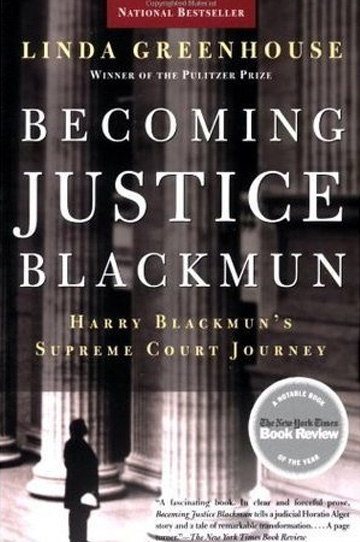
Justice of Note
May 22, 2005 | Pittsburgh Post-Gazette
Harry Blackmun was a biographer’s dream come true. Given a diary as a child, he developed a lifelong practice of recording his daily experiences, writing long, dramatic narratives in his youth and later switching to terse one-liners that at once downplayed and yet captured perfectly the monumental events he had witnessed and shaped on the U.S. Supreme Court.
Thus, in 1923, he wrote a five-page essay titled “My Illness — Appendicitis.” And, much more pointedly, in 1992 upon learning that there were enough votes on the U.S. Supreme Court to narrowly reaffirm Roe v. Wade, the 1973 decision he authored that made abortion legal:
“Roe sound.”
It is somewhat disappointing, then, that Linda Greenhouse, the Supreme Court reporter for the New York Times since 1978, chose not to write a biography. She has instead produced an extended version of her (outstanding) coverage in the Times last year, when the Library of Congress released Blackmun’s personal and official papers to much fanfare.
The book is frustratingly brief on Blackmun’s personal life — by Page 19 our Harry is nearly 50 — and will be superseded by a comprehensive biography in the future.
Nevertheless, it is a fine account of the highlights of Blackmun’s tenure as an associate justice.
His newly opened files are a bonanza for court watchers, and Greenhouse skillfully weaves many new treasures into her narrative. For instance, the justice’s conference notes reflect his excitement upon learning that Lewis Powell might supply a critical fifth vote to strike down Georgia’s criminal sodomy law in the 1986 case, Bowers v. Hardwick.
They had an exclamation point next to Powell’s name on a memo, and a notation to his law clerks, “Clerks! Can this position hold?”
It could not; Powell changed his vote days later and the majority collapsed. But Blackmun read a powerful dissent from the bench, prompting a scrawled note from Thurgood Marshall:
“HAB: ‘You was great.’ ”
We also learn that Blackmun’s renunciation of the death penalty in 1994 was the product of lobbying by his clerks, who drafted an opinion, in generic form, well before the justice selected a case in which to deploy it.
Greenhouse also provides substantive analysis of Blackmun’s jurisprudence in several hot-button areas of constitutional law, most notably the relationship between Roe and the judge’s late-blooming feminism.
In the 1970s, Blackmun noted the few female lawyers to appear before the court by their attire and found the America Civil Liberties Union’s test cases for gender equality contrived and really rather small potatoes.
But once he perceived his jealously protected opinion in Roe in jeopardy from the court’s growing right wing, Blackmun marshaled the rhetorical power of gender equality in its support.
Thus the former Mayo Clinic general counsel who originally envisioned Roe as a protector of physicians would end his career calling it a step “toward the full emancipation of women.”
The book’s greatest contribution is its thoughtful portrayal of the strains of court life on Blackmun’s lifelong friendship with Chief Justice Warren E. Burger. The two Minnesotans were playmates in kindergarten, and Blackmun stood on the altar as Burger’s best man.
But the relationship could not survive 16 years on the same bench, with Burger a Nixon conservative and Blackmun the court’s most liberal member by the ’90s .
His respect for his old friend was slowly drained by Burger’s pomposity (instructing fellow justices on presidential inauguration attire), antics (assigning himself decisions even when he was in the minority), and ineptitude (writing muddy opinions that were sniggeringly lampooned by other justices), and the two had painful rows over contentious cases.
Blackmun’s daily entry for June 25, 1995, was a simple: “WEB dies.”
He struggled visibly under the weight of his responsibilities, focusing always on the individuals “so terribly affected” by the court’s decisions. He agonized over decisions, spending long, solitary hours in the court’s library exhausting every possible research avenue.
As time went on, he increasingly allowed his feelings to spill over onto his opinions, inviting criticism from scholars that his version of the law was all sentiment and no principle.
In the most famous example, he dissented in 1989 from the court’s decision that a social worker’s repeated failure to intervene to protect a young boy from his abusive father was not a constitutional violation.
“Poor Joshua!” he wrote — and this time the words were his own, not a clerk’s. He excoriated his colleagues for their lack of “moral ambition,” and penned a phrase that nicely sums up his powerful legacy in American law:
“Compassion need not be exiled from the province of judging.”